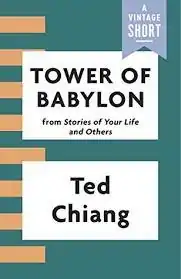| "Tower of Babylon" | |
|---|---|
| Short story by Ted Chiang | |
 The 2016 cover of the published version of the story. | |
| Language | English |
| Genre(s) | Science fantasy |
| Publication | |
| Published in | Omni |
| Publication type | Magazine |
| Publication date | November 1990 |
"Tower of Babylon" is a science fantasy novelette by American writer Ted Chiang, published in 1990.[1] The story revisits the tower of Babel myth as a construction megaproject, in a setting where the principles of pre-scientific cosmology (flat Earth, geocentrism and the Firmament) are literally true. It is Chiang's first published work.[2]
The story won the 1991 Nebula Award for Best Novelette, and was reprinted in Chiang's 2002 anthology, Stories of Your Life and Others.
Plot
The story takes place in ancient Babylon, but set in an alternate timeline where ancient Hebrew cosmology is accurate—the Earth is flat and covered by a celestial vault, harboring the Sun and the Moon in the expanse within. Humanity has been working for generations on a huge tower to reach the vault and enter Yahweh's domain. Miners are hired to pierce through the vault and among them is Hillalum, the protagonist. Upon their arrival, a celebration has been taking place for eight days, ever since the last brick was laid.
As Hillalum and his friend Nanni ascend the tower through a double spiral staircase, they learn more about the society of the tower as well as their world. Trowels are the most valuable item —instead of bricks as the rumors held, since they are in constant supply—, as dropping one prevents a bricklayer from working. Those higher up on the tower have never touched the ground, with entire generations living off balcony orchards.
Reaching the trajectory of the Moon and the Sun, the scorching heat forces the team to climb during the night. As they cross the field of stars —each no larger than a person, and occasionally falling into the Earth as literal shooting stars—, it is revealed that one of them crashed into the tower long ago and cooled off into a metallic orb, now sitting at a temple at the tower's base.
They finally reach the vault, appearing as a smooth, stony plain. They worry that drilling it might unleash a second deluge, so the excavation follows an Egyptian technique as a precaution. Indeed, they drill a water reservoir and the technique works, but Hillalum gets trapped. Barely avoiding drowning, he ascends to the surface, at first thinking it to be Heaven, but quickly realizes that he is back on Earth, close to where he started.
Hillalum realizes that the world is, in some supernatural way, akin to a cylinder seal: humans perceive Heaven and Earth as separate imprints on the edges of a clay tablet, even though the imprints were next to each other on the cylinder. The tower's construction did not enrage Yahweh because it was a futile attempt all along, as He made it geometrically impossible for humans to enter Heaven. Hillalum heads back to the tower to share his discovery with the world.
Reception
"Tower" won the 1991 Nebula Award for Best Novelette, and was nominated for the 1991 Hugo Award for Best Novelette.[3]
References
- ↑ "Tower of Babylon by Ted Chiang". goodreads.com. Goodreads. Retrieved 16 November 2016.
- ↑ Anders, Lou (July 2002). "A Conversation With Ted Chiang". SF Site. Retrieved 27 May 2017.
- ↑ The LOCUS Index to SF Awards Archived 18 June 2015 at the Wayback Machine
External links
- Tower of Babylon title listing at the Internet Speculative Fiction Database